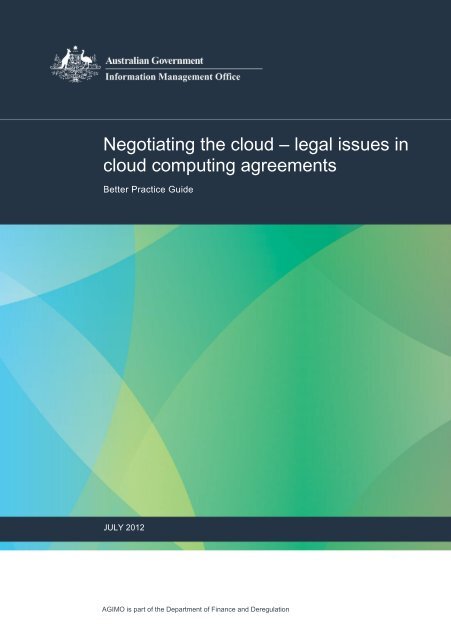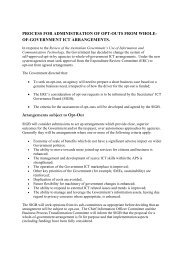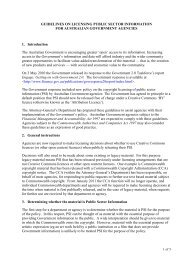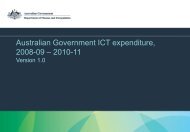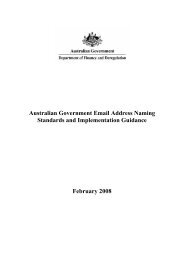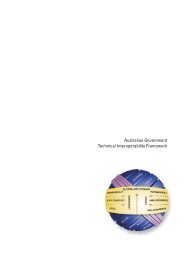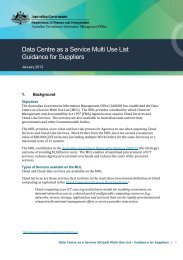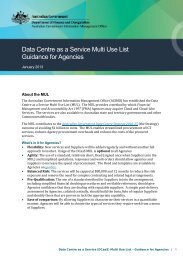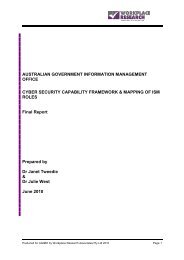Negotiating in the cloud - legal issues in cloud ... - About AGIMO
Negotiating in the cloud - legal issues in cloud ... - About AGIMO
Negotiating in the cloud - legal issues in cloud ... - About AGIMO
- No tags were found...
You also want an ePaper? Increase the reach of your titles
YUMPU automatically turns print PDFs into web optimized ePapers that Google loves.
<strong>Negotiat<strong>in</strong>g</strong> <strong>the</strong> <strong>cloud</strong> – <strong>legal</strong> <strong>issues</strong> <strong>in</strong><strong>cloud</strong> comput<strong>in</strong>g agreementsBetter Practice GuideJULY 2012<strong>AGIMO</strong> is part of <strong>the</strong> Department of F<strong>in</strong>ance and Deregulation
ContentsIntroduction 3Overview of <strong>cloud</strong> comput<strong>in</strong>g <strong>legal</strong> <strong>issues</strong> 3What is <strong>cloud</strong> comput<strong>in</strong>g? 3Deployment models 4Obta<strong>in</strong><strong>in</strong>g <strong>cloud</strong> comput<strong>in</strong>g services 4How to use this guide 4Key <strong>legal</strong> <strong>issues</strong> 5Protection of <strong>in</strong>formation 5Liability 9Performance management 10End<strong>in</strong>g <strong>the</strong> arrangement 12Dispute resolution 13O<strong>the</strong>r <strong>legal</strong> <strong>issues</strong> 13Manag<strong>in</strong>g <strong>the</strong> agreement 16Fur<strong>the</strong>r <strong>in</strong>formation 16Cloud comput<strong>in</strong>g policy guidance 16General <strong>legal</strong> guidance 17Legal checklist 17Acknowledgments 19Disclaimer 19Copyright notice 19<strong>AGIMO</strong> is part of <strong>the</strong> Department of F<strong>in</strong>ance and Deregulation
IntroductionLike <strong>cloud</strong> comput<strong>in</strong>g itself, <strong>cloud</strong> comput<strong>in</strong>g agreements appear <strong>in</strong> a wide variety of forms.These can range from simple standardised click wrap agreements to multilayered sets of termsand conditions. There are, however, a core set of <strong>legal</strong> <strong>issues</strong> that agencies should consider <strong>in</strong>any <strong>cloud</strong> comput<strong>in</strong>g agreement, whe<strong>the</strong>r <strong>the</strong> agreement expressly deals with those <strong>issues</strong> ornot.The purpose of this Better Practice Guide is to assist agencies to navigate typical <strong>legal</strong> <strong>issues</strong> <strong>in</strong><strong>cloud</strong> comput<strong>in</strong>g agreements. Some of <strong>the</strong>se <strong>issues</strong> will be familiar to those who deal regularlywith <strong>in</strong>formation technology contracts, but even <strong>in</strong> respect to those <strong>issues</strong>, <strong>the</strong> nature of <strong>cloud</strong>comput<strong>in</strong>g can create new or different risks and agencies may need to consider those <strong>issues</strong>afresh <strong>in</strong> <strong>the</strong> <strong>cloud</strong> comput<strong>in</strong>g context.The Australian Government Information Management Office (<strong>AGIMO</strong>) is <strong>in</strong>vestigat<strong>in</strong>g potentialWhole-of-Government procurement approaches for <strong>cloud</strong> comput<strong>in</strong>g dur<strong>in</strong>g 2012. Agenciesshould monitor <strong>the</strong> <strong>AGIMO</strong> blog for fur<strong>the</strong>r <strong>in</strong>formation.Overview of <strong>cloud</strong> comput<strong>in</strong>g <strong>legal</strong> <strong>issues</strong>What is <strong>cloud</strong> comput<strong>in</strong>g?As set out <strong>in</strong> <strong>the</strong> Cloud Comput<strong>in</strong>g Strategic Direction Paper 1 , <strong>the</strong> Australian Government def<strong>in</strong>es<strong>cloud</strong> comput<strong>in</strong>g as:an ICT sourc<strong>in</strong>g and delivery model for enabl<strong>in</strong>g convenient, on-demand network access to ashared pool of configurable comput<strong>in</strong>g resources (e.g. networks, servers, storage, applicationsand services) that can be rapidly provisioned and released with m<strong>in</strong>imal management effortor service provider <strong>in</strong>teraction.Cloud comput<strong>in</strong>g at <strong>the</strong> broadest level, <strong>the</strong>refore, is <strong>the</strong> provision of comput<strong>in</strong>g as a service overa network, typically <strong>the</strong> Internet.Cloud comput<strong>in</strong>g services are usually grouped <strong>in</strong>to <strong>the</strong> follow<strong>in</strong>g categories:software as a service – <strong>the</strong> provision of software over a network ra<strong>the</strong>r than <strong>the</strong> softwarebe<strong>in</strong>g loaded directly onto a locally available computerplatform as a service – <strong>the</strong> provision of comput<strong>in</strong>g platforms that create <strong>the</strong> environment foro<strong>the</strong>r software to run (for example, operat<strong>in</strong>g systems) over a network ra<strong>the</strong>r than be<strong>in</strong>gloaded directly onto a locally available computer1 http://www.f<strong>in</strong>ance.gov.au/e-government/strategy-and-governance/<strong>cloud</strong>-comput<strong>in</strong>g.html<strong>Negotiat<strong>in</strong>g</strong> <strong>the</strong> <strong>cloud</strong> – <strong>legal</strong> <strong>issues</strong> <strong>in</strong> <strong>cloud</strong> comput<strong>in</strong>g agreements | 3
<strong>in</strong>frastructure as a service – <strong>the</strong> provision of access to computer <strong>in</strong>frastructure (for example,data storage or process<strong>in</strong>g capability) over a network that is used to compliment localplatform resources.Cloud comput<strong>in</strong>g is becom<strong>in</strong>g an <strong>in</strong>creas<strong>in</strong>gly attractive model for delivery of an ever expand<strong>in</strong>grange of hardware and software functionality, primarily due to <strong>the</strong> potential cost sav<strong>in</strong>gs andenhanced flexibility that can be offered by <strong>cloud</strong> comput<strong>in</strong>g providers.Cost sav<strong>in</strong>gs can potentially be achieved as a result of <strong>the</strong> aggregation of hardware <strong>in</strong> large datacentres and <strong>the</strong> ability of such centres to offer on-demand comput<strong>in</strong>g to cater for peaks andtroughs <strong>in</strong> an agency's comput<strong>in</strong>g usage. Enhanced flexibility arises from <strong>the</strong> ability for users toaccess comput<strong>in</strong>g from a range of locations (courtesy of <strong>the</strong> Internet). This flexibility is bolsteredby <strong>the</strong> <strong>in</strong>creas<strong>in</strong>g spread of wireless Internet connectivity and <strong>the</strong> proliferation of mobileInternet enabled devices that make mobile comput<strong>in</strong>g more attractive and accessible.Deployment modelsCloud comput<strong>in</strong>g can be deployed <strong>in</strong> a number of ways <strong>in</strong>clud<strong>in</strong>g:public <strong>cloud</strong> (where access to <strong>the</strong> <strong>cloud</strong> comput<strong>in</strong>g service is not restricted to a particularentity or community of entities and is generally available to <strong>the</strong> public)private <strong>cloud</strong> (where access is restricted to a s<strong>in</strong>gle private entity – for example a s<strong>in</strong>gleagency)community <strong>cloud</strong> (where access is available for a community of entities – for example, arange of Australian Government agencies <strong>in</strong> a government community <strong>cloud</strong>)hybrid <strong>cloud</strong> (where more than one of <strong>the</strong> above models operate <strong>in</strong> tandem to provide somelevel of <strong>in</strong>teractivity between <strong>the</strong> <strong>cloud</strong>s that is not available outside of <strong>the</strong> hybrid <strong>cloud</strong>).Obta<strong>in</strong><strong>in</strong>g <strong>cloud</strong> comput<strong>in</strong>g servicesIn <strong>the</strong> Commonwealth policy context, <strong>the</strong> process of obta<strong>in</strong><strong>in</strong>g <strong>cloud</strong> comput<strong>in</strong>g services wouldnormally be classified as a procurement. As a result it will be necessary for an agency to meet all<strong>the</strong> usual requirements that apply to procurement, <strong>in</strong>clud<strong>in</strong>g compliance with:<strong>the</strong> Commonwealth Procurement Rules (CPRs)and, for FMA Act agencies:<strong>the</strong> agency’s Chief Executive Instructions<strong>the</strong> F<strong>in</strong>ancial Management and Accountability (FMA) process.In many cases, and particularly for large-scale <strong>cloud</strong> comput<strong>in</strong>g services, <strong>the</strong> Additional Rules of<strong>the</strong> CPRs are likely to be triggered. This means that <strong>cloud</strong> comput<strong>in</strong>g services will generally needto be obta<strong>in</strong>ed as <strong>the</strong> result of an open approach to <strong>the</strong> market and consequent evaluationprocess to select a preferred tenderer (or panel of providers).How to use this guideIn some cases – for example where <strong>the</strong> services are offered only by one provider because of <strong>the</strong>need for particular proprietary software or hardware – agencies may have to deal with <strong>the</strong> <strong>legal</strong>agreements proposed by <strong>the</strong> provider. In o<strong>the</strong>r cases, agencies may be able to propose <strong>the</strong>ir own<strong>legal</strong> terms. In ei<strong>the</strong>r situation, agencies should carefully consider <strong>the</strong> implications of <strong>the</strong> termsof <strong>the</strong> proposed agreement. This guide sets out some of <strong>the</strong>se considerations.In us<strong>in</strong>g <strong>the</strong> guide, agencies should be aware that:<strong>Negotiat<strong>in</strong>g</strong> <strong>the</strong> <strong>cloud</strong> – <strong>legal</strong> <strong>issues</strong> <strong>in</strong> <strong>cloud</strong> comput<strong>in</strong>g agreements | 4
This guide canvasses typical <strong>issues</strong> <strong>in</strong> <strong>cloud</strong> comput<strong>in</strong>g <strong>legal</strong> agreements but o<strong>the</strong>rsignificant <strong>issues</strong> may exist <strong>in</strong> a specific agreement. Agencies should <strong>the</strong>refore alwayscarefully review and obta<strong>in</strong> all necessary <strong>legal</strong> advice on <strong>the</strong> specific terms to use.Not all of <strong>the</strong> <strong>legal</strong> <strong>issues</strong> raised <strong>in</strong> this guide will be relevant to each <strong>cloud</strong> comput<strong>in</strong>gservice. For example, some <strong>issues</strong> relat<strong>in</strong>g to <strong>the</strong> protection of <strong>in</strong>formation may be lessimportant where <strong>the</strong> provider is not hold<strong>in</strong>g or access<strong>in</strong>g <strong>the</strong> agency’s data.The standard terms on which many <strong>cloud</strong> comput<strong>in</strong>g services are offered may not meet all of <strong>the</strong><strong>legal</strong> requirements of an agency. As those requirements may impact on <strong>the</strong> price and deliverymodel for <strong>cloud</strong> comput<strong>in</strong>g services, it is important for an agency to raise <strong>the</strong> relevant <strong>issues</strong> andcontractual positions (such as those set out <strong>in</strong> this guide) with providers early <strong>in</strong> <strong>the</strong>procurement process. This will assist <strong>the</strong> agency to negotiate an agreement that is acceptable toall parties.The key <strong>legal</strong> <strong>issues</strong> addressed by this guide can be broken down <strong>in</strong>to <strong>the</strong> follow<strong>in</strong>g categories:protection of <strong>in</strong>formationliabilityperformance managementend<strong>in</strong>g <strong>the</strong> arrangementdispute resolutiono<strong>the</strong>r <strong>legal</strong> <strong>issues</strong>.This guide also looks at <strong>the</strong> longer term <strong>issues</strong> associated with manag<strong>in</strong>g a <strong>cloud</strong> comput<strong>in</strong>gagreement over its life.Key <strong>legal</strong> <strong>issues</strong>Protection of <strong>in</strong>formationPrivacyInformation about <strong>the</strong> privacy obligations for Commonwealth contracts can be found on <strong>the</strong>Office of <strong>the</strong> Australian Information Commissioner’s (OAIC) website 2 . Agencies are also stronglyadvised to consider <strong>the</strong> Better Practice Guide – Privacy and Cloud Comput<strong>in</strong>g for AustralianGovernment Agencies 3 before enter<strong>in</strong>g <strong>in</strong>to any <strong>cloud</strong> comput<strong>in</strong>g arrangement.Cloud comput<strong>in</strong>g does not necessarily have to be privacy <strong>in</strong>vasive, but mov<strong>in</strong>g data <strong>in</strong>to <strong>the</strong><strong>cloud</strong> means that <strong>the</strong> data will move outside of <strong>the</strong> direct control of <strong>the</strong> agency and may, <strong>in</strong> some<strong>in</strong>stances, be processed and stored outside of Australia. Different levels of <strong>in</strong>direct control of this2 http://www.oaic.gov.au/3 http://www.f<strong>in</strong>ance.gov.au/e-government/strategy-and-governance/<strong>cloud</strong>-comput<strong>in</strong>g.html<strong>Negotiat<strong>in</strong>g</strong> <strong>the</strong> <strong>cloud</strong> – <strong>legal</strong> <strong>issues</strong> <strong>in</strong> <strong>cloud</strong> comput<strong>in</strong>g agreements | 5
data are possible depend<strong>in</strong>g on <strong>the</strong> type of <strong>cloud</strong> service selected and <strong>the</strong> <strong>legal</strong> protections put <strong>in</strong>place by <strong>the</strong> agency.Agencies need to be aware of <strong>the</strong>ir privacy and data security obligations when transferr<strong>in</strong>gpersonal <strong>in</strong>formation <strong>in</strong>to any <strong>cloud</strong> environment. If privacy <strong>issues</strong> cannot be adequatelyaddressed, <strong>the</strong> OAIC advises that it will not be appropriate to transfer 'personal <strong>in</strong>formation'<strong>in</strong>to a public <strong>cloud</strong>.Section 95B of <strong>the</strong> Privacy Act 1988 (Cth) requires agencies enter<strong>in</strong>g <strong>in</strong>to contracts for <strong>the</strong>provision of services to <strong>the</strong> Commonwealth, to:take contractual measures to ensure contracted services providers do not do an act orengage <strong>in</strong> a practice that would breach any Information Privacy Pr<strong>in</strong>ciples (IPPs) 4ensure agreements do not authorise providers or <strong>the</strong>ir subcontractors to do or engage <strong>in</strong> anact or practice that would breach any IPPs,if done or engaged <strong>in</strong> by <strong>the</strong> agency itself.In addition, agencies should ensure that <strong>the</strong> provider is contractually prohibited from us<strong>in</strong>g <strong>the</strong>data for any of <strong>the</strong> provider’s own purposes – such as advertis<strong>in</strong>g or o<strong>the</strong>r commercial services –as this is likely to be <strong>in</strong>consistent with <strong>the</strong> IPPs and <strong>the</strong> <strong>in</strong>tentions of <strong>the</strong> agency <strong>in</strong> enter<strong>in</strong>g <strong>the</strong>agreement.Agencies engag<strong>in</strong>g <strong>cloud</strong> service providers need to take appropriate contractual measures toensure personal <strong>in</strong>formation is protected, regardless of whe<strong>the</strong>r or not <strong>the</strong> provider (and anysubcontractors) are based <strong>in</strong> Australia or overseas. When contract<strong>in</strong>g offshore, agencies need totake particular care to ensure <strong>the</strong>y are able to enforce <strong>the</strong> provisions of <strong>the</strong> agreement.Agencies should also consider <strong>the</strong> practical implications of <strong>the</strong>ir Privacy Act obligations,<strong>in</strong>clud<strong>in</strong>g whe<strong>the</strong>r specific contractual measures enabl<strong>in</strong>g <strong>the</strong>m to meet <strong>the</strong>ir obligations arerequired. For example, IPP 7 Alteration of records conta<strong>in</strong><strong>in</strong>g personal <strong>in</strong>formation requiresagencies, where an <strong>in</strong>dividual’s request to alter a record has been refused, to attach a statementto <strong>the</strong> record on request. Agencies would need to ensure that a <strong>cloud</strong> service provider is obligedto meet this requirement.SecurityClearly one significant issue for any <strong>cloud</strong> comput<strong>in</strong>g agreement where <strong>the</strong> provider holds, or isable to access, an agency's data is <strong>the</strong> security of that data. This issue is heightened from a riskperspective where <strong>the</strong> data is sensitive (<strong>in</strong>clud<strong>in</strong>g personal <strong>in</strong>formation).Agencies should refer to <strong>the</strong> Defence Signals Directorate's Cloud Comput<strong>in</strong>g SecurityConsiderations 5 for detailed guidance on <strong>issues</strong> to consider from a security perspective. Infollow<strong>in</strong>g this guidance, agencies should develop a comprehensive risk assessment to make an<strong>in</strong>formed decision on <strong>the</strong> suitability of adopt<strong>in</strong>g a <strong>cloud</strong> based solution and assess <strong>the</strong>appropriate security protections it requires. The follow<strong>in</strong>g are contractual measures that may,depend<strong>in</strong>g on <strong>the</strong> circumstances <strong>in</strong>clud<strong>in</strong>g <strong>the</strong> type of <strong>cloud</strong> service used, be appropriate to<strong>in</strong>clude <strong>in</strong> an agreement for <strong>cloud</strong> comput<strong>in</strong>g services:where <strong>the</strong> service is to be provided from a location with<strong>in</strong> Australia, a prohibition on <strong>the</strong>provider transmitt<strong>in</strong>g data outside of Australia without <strong>the</strong> prior approval of <strong>the</strong> agency4 http://www.privacy.gov.au/materials/types/<strong>in</strong>fosheets/view/65415 http://www.dsd.gov.au/<strong>in</strong>fosec/<strong>cloud</strong>security.htm<strong>Negotiat<strong>in</strong>g</strong> <strong>the</strong> <strong>cloud</strong> – <strong>legal</strong> <strong>issues</strong> <strong>in</strong> <strong>cloud</strong> comput<strong>in</strong>g agreements | 6
<strong>the</strong> level of security and encryption to be applied to agency data held and transmitted by <strong>the</strong>provider<strong>the</strong> level of access security protocols to be implemented by <strong>the</strong> provider to defeatunauthorised attempts to access <strong>the</strong> data by third parties, provider personnel and o<strong>the</strong>rcustomers of <strong>the</strong> providerwhere physical media is damaged and replaced, requirements for <strong>the</strong> sanitisation or deletionof data <strong>in</strong> <strong>the</strong> damaged media<strong>the</strong> storage of separate packages of data – for example, it may be important to avoid <strong>the</strong>provider aggregat<strong>in</strong>g separate packages on <strong>the</strong> same hardware (as such aggregation may<strong>in</strong>crease <strong>the</strong> sensitivity of data or risks to security of <strong>the</strong> <strong>in</strong>formation)a requirement for <strong>the</strong> provider to notify <strong>the</strong> agency immediately <strong>in</strong> <strong>the</strong> event of security<strong>in</strong>cidents or <strong>in</strong>trusions, or requests from foreign government agencies for access to <strong>the</strong> data,to enable <strong>the</strong> agency to manage <strong>the</strong>se events proactivelya requirement for <strong>the</strong> provider to store data so as to prevent o<strong>the</strong>r customers of <strong>the</strong> providerfrom access<strong>in</strong>g <strong>the</strong> agency's data. For less sensitive data, logical separation supported bystrong technical security measures (where data may be held on <strong>the</strong> same servers as o<strong>the</strong>rcustomer data) may be sufficient. If <strong>the</strong> data is more sensitive, storage on specified hardwarethat is unique to <strong>the</strong> agency may be appropriate so that <strong>the</strong>re can be physical securityprecautions set up between <strong>the</strong> hardware stor<strong>in</strong>g <strong>the</strong> agency's <strong>in</strong>formation and o<strong>the</strong>rhardware held by <strong>the</strong> providera requirement for <strong>the</strong> provider to destroy or sanitise (or de-identify <strong>in</strong> <strong>the</strong> case of personal<strong>in</strong>formation) sensitive <strong>in</strong>formation held by <strong>the</strong> provider at <strong>the</strong> end of <strong>the</strong> agreement, wheresuch data is not or cannot be returned to <strong>the</strong> agency. This may need to extend to destructionof physical hardware on which such data is held to avoid risk that <strong>the</strong> data may be recoveredspecific security requirements depend<strong>in</strong>g on <strong>the</strong> nature of <strong>the</strong> service and <strong>the</strong> sensitivity of<strong>the</strong> data.ConfidentialityAn agency may have contractual, equitable or statutory obligations to keep particular<strong>in</strong>formation confidential. Therefore it is important that <strong>the</strong>se obligations are also transmitted to<strong>the</strong> provider <strong>in</strong> circumstances where <strong>the</strong> provider is stor<strong>in</strong>g or access<strong>in</strong>g an agency's data.In most cases, an agency will want a provider to meet a m<strong>in</strong>imum level of confidentiality for <strong>the</strong>agency’s <strong>in</strong>formation. In cases where <strong>the</strong> provider is obta<strong>in</strong><strong>in</strong>g access to particularly sensitive<strong>in</strong>formation, <strong>the</strong> level of protection will need to be significantly stronger. Agencies shouldconsider <strong>in</strong> an agreement:<strong>the</strong> replication of any obligations placed upon <strong>the</strong> agency by contract or lawfor non-sensitive data, requirements to ensure <strong>the</strong> provider is aware of <strong>the</strong> level ofconfidentiality required and commits to protect<strong>in</strong>g that data appropriatelyfor sensitive data, more detailed confidentiality obligations. In some cases where an extralayer of protection is necessary, it may be appropriate to:• require <strong>the</strong> provider to obta<strong>in</strong> <strong>in</strong>dividual confidentiality deeds from <strong>the</strong>ir personnel• restrict access to <strong>the</strong> agency’s data to a limited set of <strong>the</strong> provider’s personnel only.Where an agreement requires an agency to ma<strong>in</strong>ta<strong>in</strong> provider <strong>in</strong>formation as confidential,agencies should be aware of Commonwealth policies which require:restrict<strong>in</strong>g <strong>the</strong> type of provider <strong>in</strong>formation that is subject to confidentiality<strong>Negotiat<strong>in</strong>g</strong> <strong>the</strong> <strong>cloud</strong> – <strong>legal</strong> <strong>issues</strong> <strong>in</strong> <strong>cloud</strong> comput<strong>in</strong>g agreements | 7
<strong>the</strong> <strong>in</strong>clusion of standard Commonwealth exceptions to confidentiality <strong>in</strong>clud<strong>in</strong>g <strong>the</strong> right toprovide <strong>in</strong>formation to <strong>the</strong> relevant m<strong>in</strong>ister as well as houses of Parliament.Records management requirementsAgencies should refer to Records management and <strong>the</strong> <strong>cloud</strong> - a checklist 6 prepared by <strong>the</strong>National Archives of Australia for records management considerations <strong>in</strong> <strong>cloud</strong> comput<strong>in</strong>g. Thatadvice requires agencies to <strong>in</strong>clude appropriate controls and protections (for example throughagreement with <strong>the</strong> <strong>cloud</strong> service provider) that match <strong>the</strong> value of <strong>the</strong> records and address <strong>the</strong>risks of <strong>cloud</strong> comput<strong>in</strong>g for an agency’s records.AuditAll <strong>the</strong> protections described <strong>in</strong> this section may potentially be worthless unless <strong>the</strong> agency isable to confirm that required <strong>in</strong>formation protection requirements are <strong>in</strong> fact be<strong>in</strong>g met. Audit of<strong>cloud</strong> comput<strong>in</strong>g arrangements is one way of check<strong>in</strong>g compliance. Audit of such arrangementsis however potentially complicated by:<strong>the</strong> location of <strong>the</strong> data – which, unless specifically identified and locked down <strong>in</strong> <strong>the</strong>agreement, may be unknown to <strong>the</strong> agency, and could be located <strong>in</strong> one or more discretesites <strong>in</strong> foreign countries<strong>the</strong> nature of <strong>cloud</strong> comput<strong>in</strong>g itself which may <strong>in</strong>volve agency data be<strong>in</strong>g spread across alarge number of different provider comput<strong>in</strong>g devices (<strong>in</strong> order to harness <strong>the</strong> economies ofscale and on-demand provision of comput<strong>in</strong>g that <strong>cloud</strong> comput<strong>in</strong>g services offer).As a result, agencies should consider <strong>in</strong>clud<strong>in</strong>g <strong>the</strong> follow<strong>in</strong>g rights <strong>in</strong> any agreement: restrict<strong>in</strong>g <strong>the</strong> locations/countries <strong>in</strong> which agency data may be held (with movement tonew locations permitted with advance approval <strong>in</strong> writ<strong>in</strong>g from <strong>the</strong> agency) rights to audit <strong>the</strong> provider’s compliance with <strong>the</strong> agreement <strong>in</strong>clud<strong>in</strong>g rights of access to <strong>the</strong>provider’s premises where relevant records and agency data is be<strong>in</strong>g held audit rights for <strong>the</strong> agency (or its nom<strong>in</strong>ee), <strong>the</strong> Auditor-General and <strong>the</strong> InformationCommissioner a right for <strong>the</strong> agency to appo<strong>in</strong>t a commercial auditor as its nom<strong>in</strong>ee (as this allows <strong>the</strong>agency to appo<strong>in</strong>t an auditor <strong>in</strong> <strong>the</strong> same location as <strong>the</strong> provider’s data centre to save costsand ensure compliance with relevant jurisdictional laws) where technically available, <strong>the</strong> right for <strong>the</strong> agency to remotely monitor access to its dataand where this is not possible, a requirement that <strong>the</strong> provider ma<strong>in</strong>ta<strong>in</strong> an audit log ofaccess to <strong>the</strong> agency's data and provide that log to <strong>the</strong> agency on request.Compensation for data loss/misuseIt is possible that data could be permanently lost by a <strong>cloud</strong> comput<strong>in</strong>g services provider <strong>in</strong> anumber of circumstances such as technical or operator error as well as fire or o<strong>the</strong>r disasters.Similarly, <strong>the</strong>re is always <strong>the</strong> risk of misuse of data by rogue employees of <strong>the</strong> provider orcompromise by external parties.While <strong>the</strong> probability of such problems can be m<strong>in</strong>imised by <strong>the</strong> provider ensur<strong>in</strong>g offsite databack-up, proper technical and security tra<strong>in</strong><strong>in</strong>g and hardware ma<strong>in</strong>tenance, it is important for6 http://www.naa.gov.au/records-management/publications/<strong>cloud</strong>-checklist.aspx<strong>Negotiat<strong>in</strong>g</strong> <strong>the</strong> <strong>cloud</strong> – <strong>legal</strong> <strong>issues</strong> <strong>in</strong> <strong>cloud</strong> comput<strong>in</strong>g agreements | 8
an agency to consider how to address data loss or misuse <strong>in</strong> its agreement with <strong>the</strong> provider.This is particularly <strong>the</strong> case where <strong>the</strong> data is provided by third parties (such as members of <strong>the</strong>public) and <strong>the</strong> agency risks <strong>legal</strong> liability <strong>in</strong> <strong>the</strong> event data is unrecoverable or used<strong>in</strong>appropriately.An agency, <strong>in</strong> determ<strong>in</strong><strong>in</strong>g <strong>the</strong> risks posed by a <strong>cloud</strong> comput<strong>in</strong>g arrangement, should considerwhich party is best placed to manage those risks and <strong>the</strong>refore whe<strong>the</strong>r <strong>the</strong> agreement with <strong>the</strong><strong>cloud</strong> service provider should:require <strong>the</strong> provider to be responsible for <strong>in</strong>direct and consequential losses (which willtypically be <strong>the</strong> type of losses that flow from data loss and misuse)<strong>in</strong>clude an <strong>in</strong>demnity from <strong>the</strong> provider <strong>in</strong> respect to data loss or misuse as a result of <strong>the</strong>negligent, il<strong>legal</strong> or wilfully wrong act or omission of <strong>the</strong> provider or its personnelhave a separate liability cap for data loss or misuse that is sufficiently high to cover potentialliability aris<strong>in</strong>g from such loss or misuse.For more detail on <strong>the</strong> above terms, refer to <strong>the</strong> Liability section of this guide.SubcontractorsA critical component of ensur<strong>in</strong>g that an agency has proper protection for its <strong>in</strong>formation is toensure, <strong>in</strong> <strong>the</strong> agreement with <strong>the</strong> provider, that any subcontractors of <strong>the</strong> provider are alsoobliged to meet <strong>the</strong> same requirements as <strong>the</strong> provider. If this is not done, an agency may f<strong>in</strong>dthat any protections it has negotiated <strong>in</strong>to <strong>the</strong> agreement with <strong>the</strong> provider do not end up giv<strong>in</strong>git <strong>the</strong> desired protection where <strong>the</strong> services are carried out by subcontractors. It will also beimportant to know who a provider’s subcontractors are so that an agency understands whatcompanies may have access to <strong>the</strong> agency’s systems and data.LiabilityLimitations on liabilityIn common with traditional <strong>in</strong>formation technology agreements, <strong>cloud</strong> service agreementstypically seek to m<strong>in</strong>imise <strong>the</strong> provider's liability for any loss that arises from <strong>the</strong> provision of<strong>the</strong> service. This may <strong>in</strong>clude:exclud<strong>in</strong>g <strong>in</strong>direct and consequential losses (such as data loss)sett<strong>in</strong>g low liability caps (typically equivalent to one year’s fees under <strong>the</strong> agreement) or <strong>in</strong>some cases exclud<strong>in</strong>g liability entirelynot exclud<strong>in</strong>g key types of liability from any liability cap.Agencies should seek to comply with <strong>the</strong> Commonwealth's policy on capp<strong>in</strong>g supplier liability <strong>in</strong><strong>in</strong>formation technology contracts (see F<strong>in</strong>ance Circular 2006/03 7 ) when negotiat<strong>in</strong>g limitationswith providers. The start<strong>in</strong>g po<strong>in</strong>t is that <strong>the</strong> Commonwealth will accept a cap on <strong>the</strong> provider'sliability as a default position <strong>in</strong> <strong>in</strong>formation technology contracts provided that a list ofexceptions to <strong>the</strong> cap is agreed by <strong>the</strong> provider. These exceptions are:personal <strong>in</strong>jury (<strong>in</strong>clud<strong>in</strong>g sickness and death)loss or damage to tangible propertybreach of privacy, security or confidentiality obligations7 http://www.f<strong>in</strong>ance.gov.au/publications/f<strong>in</strong>ance-circulars/2006/03.html<strong>Negotiat<strong>in</strong>g</strong> <strong>the</strong> <strong>cloud</strong> – <strong>legal</strong> <strong>issues</strong> <strong>in</strong> <strong>cloud</strong> comput<strong>in</strong>g agreements | 9
<strong>in</strong>tellectual property <strong>in</strong>fr<strong>in</strong>gementunlawful, or il<strong>legal</strong>, acts or omissions.In addition to <strong>the</strong> standard exceptions, agencies should consider whe<strong>the</strong>r <strong>the</strong> risks of <strong>the</strong>irprocurement justify additional protection such as <strong>in</strong>clud<strong>in</strong>g <strong>the</strong> follow<strong>in</strong>g as exceptions to aprovider's liability cap:loss caused by service <strong>in</strong>terruptiondata lossmisuse of data.Decisions made by agencies about <strong>the</strong> amount of any liability cap should be <strong>in</strong>formed by a riskassessment that exam<strong>in</strong>es all identifiable potential liabilities and determ<strong>in</strong>es <strong>the</strong> likelihood andeffect of such risks be<strong>in</strong>g realised.IndemnityAn <strong>in</strong>demnity is a <strong>legal</strong>ly b<strong>in</strong>d<strong>in</strong>g promise by which one party undertakes to accept <strong>the</strong> risk ofloss or damage ano<strong>the</strong>r party may suffer. In some <strong>cloud</strong> comput<strong>in</strong>g service agreements <strong>the</strong>provider will require an <strong>in</strong>demnity from <strong>the</strong> agency. These typically might <strong>in</strong>clude <strong>in</strong>demnitiesfor:<strong>in</strong>fr<strong>in</strong>gement of a third party’s rights (<strong>in</strong>clud<strong>in</strong>g privacy and <strong>in</strong>tellectual property rights) by<strong>the</strong> provider as a result of <strong>the</strong> provider’s process<strong>in</strong>g of third party data supplied by <strong>the</strong>agencyany loss or damage aris<strong>in</strong>g from <strong>the</strong> agency’s use of <strong>the</strong> servicebreach of <strong>the</strong> agreement by <strong>the</strong> agency.Agree<strong>in</strong>g to give an <strong>in</strong>demnity may expose an agency to <strong>the</strong> risk of liability or costs that it wouldnot o<strong>the</strong>rwise be liable for. Indemnities given by an agency must comply with:<strong>the</strong> Commonwealth's <strong>in</strong>demnity guidel<strong>in</strong>es – <strong>the</strong>se guidel<strong>in</strong>es make clear that agenciesshould only give <strong>in</strong>demnities where <strong>the</strong> expected benefits outweigh <strong>the</strong> level and cost of riskbe<strong>in</strong>g accepted and that generally <strong>the</strong> party best placed to manage a risk should bear thatrisk<strong>the</strong> FMA Act and Regulations – an <strong>in</strong>demnity will form a cont<strong>in</strong>gent liability that may requirean FMA agency to obta<strong>in</strong> agreement under FMA Regulation 10.For fur<strong>the</strong>r details on <strong>the</strong> handl<strong>in</strong>g of liability caps and <strong>in</strong>demnities, agencies can refer toAustralian Government Solicitor (AGS) Legal Brief<strong>in</strong>g 8 .Performance managementService levelsService levels are an important way of ensur<strong>in</strong>g that a provider meets <strong>the</strong> level of serviceexpected by <strong>the</strong> agency. This is particularly important where <strong>the</strong> <strong>cloud</strong> comput<strong>in</strong>g service iscritical ei<strong>the</strong>r to <strong>the</strong> function<strong>in</strong>g of an agency or to <strong>the</strong> agency’s clients. There are three elementscommon to an effective service level regime:8 http://www.ags.gov.au/publications/<strong>legal</strong>-brief<strong>in</strong>g/br93.pdf<strong>Negotiat<strong>in</strong>g</strong> <strong>the</strong> <strong>cloud</strong> – <strong>legal</strong> <strong>issues</strong> <strong>in</strong> <strong>cloud</strong> comput<strong>in</strong>g agreements | 10
The service levels have to be mean<strong>in</strong>gful – that is, <strong>the</strong>y need to measure performance that isimportant to <strong>the</strong> agency.The provider’s performance aga<strong>in</strong>st service levels should be able to be easily measured andauditable.The <strong>in</strong>centive (whe<strong>the</strong>r stick or carrot or comb<strong>in</strong>ation of both) for <strong>the</strong> provider to meet <strong>the</strong>service levels has to be sufficient to encourage performance at <strong>the</strong> required level. Anyservice level credits paid to an agency for <strong>the</strong> provider’s failure to meet <strong>the</strong> service levelsshould not exceed a genu<strong>in</strong>e pre-estimate of <strong>the</strong> loss to avoid be<strong>in</strong>g a penalty and <strong>the</strong>reforeunenforceable.It should come as no surprise that providers will generally only offer to meet service levels that<strong>the</strong>y know are well with<strong>in</strong> <strong>the</strong>ir performance capability and so considerable negotiation may berequired for an agency to achieve levels that are suitable for its needs, where <strong>the</strong>se exceed <strong>the</strong>standard commercial offer<strong>in</strong>gs.Response timesWhere an <strong>in</strong>terruption to all or part of <strong>the</strong> service does occur, it will be important tocontractually tie <strong>the</strong> provider to <strong>in</strong>vestigate and, where it is <strong>in</strong> <strong>the</strong> doma<strong>in</strong> of <strong>the</strong> provider,resolve <strong>the</strong> <strong>in</strong>terruption as soon as possible. An agency may wish to categorise response timesbased on <strong>the</strong> severity of <strong>the</strong> fault.Flexibility of serviceOne of <strong>the</strong> key advantages of a <strong>cloud</strong> comput<strong>in</strong>g services model is that it should offer flexibilityof service with <strong>the</strong> ability to easily scale up or down <strong>the</strong> required level of service depend<strong>in</strong>g onagency needs. It is <strong>the</strong>refore important for an agency to consider its requirements <strong>in</strong> this regard.Key <strong>issues</strong> to consider are:mak<strong>in</strong>g sure that <strong>the</strong> pric<strong>in</strong>g model is suitable – if <strong>the</strong> agency’s demand for comput<strong>in</strong>g risesor falls, will <strong>the</strong> agency be required to pay higher prices (on a per unit basis) for <strong>the</strong> change<strong>in</strong> scale of <strong>the</strong> service?does <strong>the</strong> agreement allow for changes <strong>in</strong> <strong>the</strong> agency’s demand to be easily implemented orwill it require a potentially time consum<strong>in</strong>g negotiation process?how will <strong>the</strong> agency ensure compliance with FMA Act requirements (for example, FMARegulations 9 and 10) as a result of scalable service costs?Bus<strong>in</strong>ess cont<strong>in</strong>uity and disaster recoveryBus<strong>in</strong>ess cont<strong>in</strong>uity and disaster recovery will often be a critical consideration <strong>in</strong> <strong>cloud</strong>comput<strong>in</strong>g service agreements given <strong>the</strong> reliance that an agency may have on obta<strong>in</strong><strong>in</strong>gun<strong>in</strong>terrupted access to that service. Threats to bus<strong>in</strong>ess cont<strong>in</strong>uity <strong>in</strong> this context can <strong>in</strong>clude:<strong>in</strong>terruption to communications networkshardware or software failurepower failuredisaster (fire, storm, riot etc) that disables access to <strong>the</strong> service.Agencies should <strong>the</strong>refore consider <strong>in</strong>clud<strong>in</strong>g protections <strong>in</strong> <strong>the</strong>ir agreement with <strong>the</strong> providerwhere necessary to ensure access to <strong>the</strong> service is not disrupted. As an example, <strong>the</strong>se could<strong>in</strong>clude:<strong>Negotiat<strong>in</strong>g</strong> <strong>the</strong> <strong>cloud</strong> – <strong>legal</strong> <strong>issues</strong> <strong>in</strong> <strong>cloud</strong> comput<strong>in</strong>g agreements | 11
ensur<strong>in</strong>g <strong>the</strong> provider has a geographically separate disaster recovery site with seamlesstransitionensur<strong>in</strong>g <strong>the</strong> provider is able to operate <strong>in</strong> <strong>the</strong> event that ma<strong>in</strong>s power is disrupted (forexample, use of Un<strong>in</strong>terruptible Power Supply and back-up generators)ensur<strong>in</strong>g that bus<strong>in</strong>ess cont<strong>in</strong>uity is a strict requirement and not subject to qualifiers such as'reasonable efforts'requir<strong>in</strong>g a bus<strong>in</strong>ess cont<strong>in</strong>uity and disaster recovery plan be submitted for comment andapproval by <strong>the</strong> agencylimit<strong>in</strong>g <strong>the</strong> right for <strong>the</strong> provider to suspend <strong>the</strong>ir service for force majeure reasons tocircumstances where <strong>the</strong> bus<strong>in</strong>ess cont<strong>in</strong>uity and disaster recovery plan has been properlyfollowed and implementedensur<strong>in</strong>g that scheduled ma<strong>in</strong>tenance outages of provider systems do not occur dur<strong>in</strong>g hoursthat <strong>the</strong> agency requires access and use of <strong>the</strong> system (a common problem if <strong>the</strong> service isprovided from a substantially different time zone).Agencies may also need to take o<strong>the</strong>r precautions outside of <strong>the</strong> agreement (for example, <strong>in</strong>relation to <strong>the</strong>ir communications providers) to m<strong>in</strong>imise disruptions (for example, <strong>issues</strong> withan agency’s <strong>in</strong>ternet gateway) that are not <strong>the</strong> fault of <strong>the</strong> <strong>cloud</strong> comput<strong>in</strong>g provider. Theprovision of substantial services by way of <strong>the</strong> <strong>cloud</strong> could amplify <strong>the</strong> impact of any failuresthat occur <strong>in</strong> support<strong>in</strong>g contracts.End<strong>in</strong>g <strong>the</strong> arrangementTerm<strong>in</strong>ation for convenience and early term<strong>in</strong>ation feesAs with all government contracts it is important to consider <strong>in</strong>clusion of an early term<strong>in</strong>ationclause (without <strong>the</strong> default of <strong>the</strong> provider) <strong>in</strong> <strong>the</strong> agreement that allows an agency to term<strong>in</strong>ateor reduce <strong>the</strong> agreement at any time for any reason (<strong>the</strong>se are often known as 'term<strong>in</strong>ation forconvenience' clauses).Where <strong>the</strong>re is provision for early term<strong>in</strong>ation, agencies should consider what payments applyto <strong>the</strong> early term<strong>in</strong>ation. If compensation is appropriate, it should not exceed reasonable costsassociated with <strong>the</strong> term<strong>in</strong>ation and would not, for example, extend to additional costs such asto cover loss of profit on <strong>the</strong> part of <strong>the</strong> provider. Significant early term<strong>in</strong>ation fees may act as abarrier to competition <strong>in</strong> <strong>the</strong> <strong>cloud</strong> services market and agencies may wish to consider this issuewhen determ<strong>in</strong><strong>in</strong>g whe<strong>the</strong>r to accept early term<strong>in</strong>ation fees or not.Term<strong>in</strong>ation for defaultAn agency should ensure that it has <strong>the</strong> right to term<strong>in</strong>ate for default where <strong>the</strong> provider doesnot meet <strong>the</strong> agency’s reasonable requirements as set out <strong>in</strong> <strong>the</strong> agreement. The agency shouldalso consider whe<strong>the</strong>r specific rights to term<strong>in</strong>ate for default are required (for example, see <strong>the</strong>discussion of change of control <strong>in</strong> this guide).Provider's right to term<strong>in</strong>ateProviders will ord<strong>in</strong>arily seek a right to term<strong>in</strong>ate <strong>the</strong> agreement <strong>in</strong> certa<strong>in</strong> circumstances, forexample for agency default. In respect to any such right, <strong>the</strong> agency should consider <strong>in</strong>clud<strong>in</strong>g asufficiently long notice period before <strong>the</strong> term<strong>in</strong>ation becomes effective to enable <strong>the</strong> agency tof<strong>in</strong>d a suitable alternative provider.<strong>Negotiat<strong>in</strong>g</strong> <strong>the</strong> <strong>cloud</strong> – <strong>legal</strong> <strong>issues</strong> <strong>in</strong> <strong>cloud</strong> comput<strong>in</strong>g agreements | 12
Legal advice on term<strong>in</strong>ationTerm<strong>in</strong>ation of any agreement is a serious matter and should only be undertaken, no matterhow clear <strong>the</strong> word<strong>in</strong>g of <strong>the</strong> agreement, follow<strong>in</strong>g specific <strong>legal</strong> advice.Disengagement/transition of servicesDisengagement can be a key issue where <strong>the</strong> <strong>cloud</strong> comput<strong>in</strong>g services are critical services for<strong>the</strong> agency. In addition, easy and smooth disengagement and transition may ultimately lead <strong>in</strong><strong>the</strong> longer term to greater competition and lower prices for <strong>cloud</strong> comput<strong>in</strong>g services togovernment as <strong>the</strong> barriers to transferr<strong>in</strong>g from one provider to ano<strong>the</strong>r are reduced.If an agency is transition<strong>in</strong>g to a new <strong>cloud</strong> comput<strong>in</strong>g services provider or alternativelybr<strong>in</strong>g<strong>in</strong>g <strong>the</strong> services back <strong>in</strong>-house, <strong>the</strong>n it will be important for <strong>the</strong> agency to consider<strong>in</strong>clud<strong>in</strong>g requirements <strong>in</strong> <strong>the</strong> agreement that <strong>the</strong> provider will:give all reasonable assistance <strong>in</strong> help<strong>in</strong>g with <strong>the</strong> disengagement and transition <strong>in</strong>clud<strong>in</strong>gretrieval of all data <strong>in</strong> formats approved by <strong>the</strong> agencysupply a detailed disengagement and transition plan to give <strong>the</strong> agency confidence <strong>in</strong> <strong>the</strong>nature and scope of <strong>the</strong> provider’s disengagement servicesnot delete any data at <strong>the</strong> end of <strong>the</strong> agreement without <strong>the</strong> express approval of <strong>the</strong> agency.Dispute resolutionIt is important to be clear about how disputes <strong>in</strong> relation to <strong>the</strong> <strong>cloud</strong> comput<strong>in</strong>g agreement willbe resolved. Agencies should ensure that, at a m<strong>in</strong>imum, <strong>the</strong> agreement states what country's(and jurisdiction's) laws apply to <strong>the</strong> agreement, which courts can hear disputes about <strong>the</strong>agreement (known as <strong>the</strong> choice of law provisions) and whe<strong>the</strong>r alternative dispute resolutionmechanisms such as arbitration are proposed.Even if carefully drafted choice of law provisions are <strong>in</strong>cluded <strong>in</strong> an agreement, it will notnecessarily preclude a court from apply<strong>in</strong>g different laws where <strong>the</strong> nom<strong>in</strong>ated laws, or forum,are not appropriate <strong>in</strong> <strong>the</strong> context of <strong>the</strong> relevant agreement or dispute.'Choice of law' provisions may also have no effect on non-contractual <strong>legal</strong> <strong>issues</strong> that arise <strong>in</strong><strong>the</strong> context of a <strong>cloud</strong> comput<strong>in</strong>g arrangement. For example, any contractual provision whichpurports to exclude <strong>the</strong> operation of a non-excludable warranty aris<strong>in</strong>g under <strong>the</strong> Competitionand Consumer Act 2010 (Cth) would be void under Australian law. The appropriate forum forhear<strong>in</strong>g disputes about defamation or ano<strong>the</strong>r civil wrong may also be determ<strong>in</strong>ed withoutreference to any agreed contractual clause. Agencies should <strong>the</strong>refore consider seek<strong>in</strong>g <strong>legal</strong>advice regard<strong>in</strong>g all risks associated with <strong>cloud</strong> arrangements ra<strong>the</strong>r than just risks aris<strong>in</strong>gdirectly from <strong>the</strong> agreement.Agencies should carefully consider <strong>the</strong> implications of choice of law provisions and proposeddispute resolution processes, particularly where such processes are compulsory. It may benecessary for agencies to obta<strong>in</strong> <strong>legal</strong> advice from lawyers <strong>in</strong> all relevant jurisdictions <strong>in</strong>clud<strong>in</strong>g<strong>the</strong> jurisdiction where <strong>the</strong> service is actually to be provided and <strong>the</strong> jurisdiction whose lawsapply to <strong>the</strong> agreement. That advice may need to address potential costs, hidden risks andpractical implications of <strong>the</strong> proposed arrangements.O<strong>the</strong>r <strong>legal</strong> <strong>issues</strong>There are a range of o<strong>the</strong>r <strong>legal</strong> <strong>issues</strong> which may appear <strong>in</strong> a <strong>cloud</strong> comput<strong>in</strong>g servicesagreement.<strong>Negotiat<strong>in</strong>g</strong> <strong>the</strong> <strong>cloud</strong> – <strong>legal</strong> <strong>issues</strong> <strong>in</strong> <strong>cloud</strong> comput<strong>in</strong>g agreements | 13
Introduction of harmful codeA potential threat to an agency’s systems and data will always be posed by harmful code (such asviruses and o<strong>the</strong>r malicious code). In <strong>the</strong> <strong>cloud</strong> comput<strong>in</strong>g environment, agencies will need torely on <strong>the</strong> provider apply<strong>in</strong>g sufficient protection aga<strong>in</strong>st <strong>the</strong> <strong>in</strong>troduction of harmful code <strong>in</strong>hosted data and systems as well as via any communication with an agency’s local systems.Agencies should <strong>the</strong>refore consider <strong>in</strong> each case <strong>the</strong> potential risks posed by harmful code and<strong>the</strong> relevant obligations that should be imposed on <strong>the</strong> provider to ensure that agency systemsand data are protected.Change of control and assignment/novationIt is critically important that an agency knows what entity it is enter<strong>in</strong>g <strong>in</strong>to a <strong>cloud</strong> comput<strong>in</strong>gservices agreement with and that it can control whe<strong>the</strong>r it allows ano<strong>the</strong>r entity to obta<strong>in</strong>control of <strong>the</strong> <strong>in</strong>itial provider. This is especially important where <strong>the</strong> provider stores sensitivedata or provides services for sensitive comput<strong>in</strong>g tasks. There are, for example, some entitiesthat <strong>the</strong> Australian Government is not permitted to contract with (for example, entities thatAustralia has agreed under <strong>in</strong>ternational law not to deal with) and o<strong>the</strong>rs that are deemed topose a threat to <strong>the</strong> national security of Australia. Some ways of deal<strong>in</strong>g with this issue <strong>in</strong>clude:requir<strong>in</strong>g <strong>the</strong> provider to <strong>in</strong>form <strong>the</strong> agency <strong>in</strong> advance (subject to any list<strong>in</strong>g rules of arelevant stock exchange) of any proposed change <strong>in</strong> control of <strong>the</strong> provider – such aschanges <strong>in</strong> key management positions or changes <strong>in</strong> significant shareholdersprovid<strong>in</strong>g <strong>the</strong> agency with a right to term<strong>in</strong>ate <strong>in</strong> <strong>the</strong> event that a change of controlcompromises <strong>the</strong> agency or <strong>the</strong> Australian Governmentrequir<strong>in</strong>g that any transfer of <strong>the</strong> provider’s rights and obligations under <strong>the</strong> agreement toano<strong>the</strong>r entity (commonly referred to as 'assignment' <strong>in</strong> <strong>the</strong> case of rights and 'novation' <strong>in</strong>relation to rights and obligations) be subject to approval <strong>in</strong> advance by <strong>the</strong> agencyrequir<strong>in</strong>g that any subcontractors be made known to <strong>the</strong> agency for consideration before <strong>the</strong>agreement is entered <strong>in</strong>to and provid<strong>in</strong>g <strong>the</strong> agency with a right to approve <strong>the</strong> <strong>in</strong>volvementof any new subcontractors.Change of terms at discretion of <strong>the</strong> providerSome <strong>cloud</strong> comput<strong>in</strong>g agreements, typically standardised services <strong>in</strong> <strong>the</strong> public <strong>cloud</strong> that areavailable to many customers, <strong>in</strong>clude clauses allow<strong>in</strong>g <strong>the</strong> provider to change <strong>the</strong> terms of <strong>the</strong>agreement at any time at <strong>the</strong>ir sole discretion (that is, without <strong>in</strong>put from <strong>the</strong> agency). From acommercial po<strong>in</strong>t of view, it is easy to understand why a provider may <strong>in</strong>clude such a clause –especially where it has many thousands of customers us<strong>in</strong>g <strong>the</strong> service. However, such a clausewill create a very substantial risk for an agency, particularly if <strong>the</strong> agency has negotiated with<strong>the</strong> provider to <strong>in</strong>clude <strong>the</strong> types of clauses that are set out <strong>in</strong> this guide. As a result, agenciesshould consider ei<strong>the</strong>r:delet<strong>in</strong>g <strong>the</strong> right or mak<strong>in</strong>g <strong>the</strong> right subject to <strong>the</strong> agency’s agreement to any change, orensur<strong>in</strong>g that <strong>the</strong> provider is obliged to notify <strong>the</strong> agency well <strong>in</strong> advance of any changes andgive <strong>the</strong> agency <strong>the</strong> right to term<strong>in</strong>ate <strong>the</strong> agreement if it does not agree to <strong>the</strong> changes.Application of foreign laws and transborder data transferAgencies should be aware that data stored by a <strong>cloud</strong> services provider may be subject to foreignlaws (<strong>in</strong>clud<strong>in</strong>g where stored <strong>in</strong> Australia under <strong>the</strong> control of a provider subject to foreign<strong>Negotiat<strong>in</strong>g</strong> <strong>the</strong> <strong>cloud</strong> – <strong>legal</strong> <strong>issues</strong> <strong>in</strong> <strong>cloud</strong> comput<strong>in</strong>g agreements | 14
laws) as may data that is transferred <strong>in</strong>ternationally. Agencies should <strong>the</strong>refore carefullyconsider <strong>the</strong> impact of such laws when consider<strong>in</strong>g plac<strong>in</strong>g data <strong>in</strong>to <strong>the</strong> <strong>cloud</strong>. For example:In certa<strong>in</strong> circumstances, <strong>the</strong> US PATRIOT Act allows <strong>the</strong> US government to obta<strong>in</strong> data heldanywhere <strong>in</strong> <strong>the</strong> world by US companies or companies with sufficient connections to <strong>the</strong> US.This would extend to data centres based <strong>in</strong> Australia that are operated by US companies anddata centres based <strong>in</strong> <strong>the</strong> US operated by non-US companies.The European Community requires that transfers of personal data to third countries outside<strong>the</strong> EC must comply with <strong>the</strong> EC Directive on Data Protection which requires that thirdcountries must be assessed as ensur<strong>in</strong>g an adequate level of protection for <strong>the</strong> data.The European Commission has proposed new data protection laws that <strong>in</strong>clude arequirement that EU rules must apply if personal data is handled outside <strong>the</strong> EU bycompanies that are active <strong>in</strong> <strong>the</strong> EU market and offer <strong>the</strong>ir services to EU citizens. Theseproposed laws could <strong>the</strong>refore impact on how <strong>cloud</strong> providers treat <strong>the</strong>ir data hold<strong>in</strong>gs(<strong>in</strong>clud<strong>in</strong>g data held on behalf of Australian Government agencies). The proposed laws areyet to be considered by <strong>the</strong> European Parliament and agencies <strong>in</strong>terested <strong>in</strong> <strong>the</strong> <strong>cloud</strong> shouldkeep a watch<strong>in</strong>g brief on developments <strong>in</strong> this area.Fur<strong>the</strong>r <strong>issues</strong>Agencies should closely check <strong>cloud</strong> service agreements to identify any o<strong>the</strong>r provisions thatmay be problematic. Examples of o<strong>the</strong>r potential <strong>legal</strong> <strong>issues</strong> that may need to be addressed<strong>in</strong>clude:Freedom of Information Act 1982 (Cth) <strong>issues</strong> – <strong>the</strong> agency should ensure that <strong>the</strong> <strong>cloud</strong>services arrangement does not prevent it from comply<strong>in</strong>g with its obligations under <strong>the</strong> FOIAct. This would <strong>in</strong>clude ensur<strong>in</strong>g that it can access <strong>the</strong> agency's data <strong>in</strong> <strong>the</strong> event that an FOIrequest is received and amend personal <strong>in</strong>formation <strong>in</strong> response to a request for amendmentunder <strong>the</strong> Privacy Act or FOI Act.Intellectual property ownership – <strong>the</strong> agency should ensure that <strong>the</strong> agreement does nottransfer <strong>in</strong>tellectual property ownership to <strong>the</strong> provider <strong>in</strong> any data stored by <strong>the</strong> provideron behalf of an agency.Publicity by <strong>the</strong> provider <strong>in</strong> respect of agreement – normally this would only be byagreement of an agency.Use of Commonwealth brand<strong>in</strong>g and logos by <strong>the</strong> provider – this is only permitted <strong>in</strong>accordance with <strong>the</strong> It’s an Honour website 9 managed by <strong>the</strong> Department of <strong>the</strong> PrimeM<strong>in</strong>ister and Cab<strong>in</strong>et.Responsibility for end-users – agencies should be very careful about tak<strong>in</strong>g on responsibilityfor what public end users may do with data and applications made available to <strong>the</strong>m throughgovernment websites and applications as <strong>the</strong> agency will generally have little or no controlover <strong>the</strong> activities of end-users.Export controls – where data is provided across country borders (and back aga<strong>in</strong>) <strong>the</strong>agency will need to consider <strong>the</strong> impact of export control laws <strong>in</strong> <strong>the</strong> relevant jurisdictionswhich may impact on <strong>the</strong> type of data that may be provided to a <strong>cloud</strong> services provider and<strong>the</strong> country <strong>in</strong> which <strong>the</strong> <strong>cloud</strong> services provider operates. This is an evolv<strong>in</strong>g area thatagencies should keep a watchful eye on.9 http://www.itsanhonour.gov.au/coat-arms/<strong>Negotiat<strong>in</strong>g</strong> <strong>the</strong> <strong>cloud</strong> – <strong>legal</strong> <strong>issues</strong> <strong>in</strong> <strong>cloud</strong> comput<strong>in</strong>g agreements | 15
Requirement to take updates – agencies should ensure that any automatic updat<strong>in</strong>g ofsoftware that is required by <strong>the</strong> provider is consistent and compatible with exist<strong>in</strong>g agencysystems.Manag<strong>in</strong>g <strong>the</strong> agreementThe key <strong>issues</strong> to keep <strong>in</strong> m<strong>in</strong>d <strong>in</strong> contract manag<strong>in</strong>g a <strong>cloud</strong> services agreement are:In <strong>the</strong> first place, make sure terms <strong>in</strong> <strong>the</strong> agreement are appropriate and reasonable for <strong>the</strong>agency, and if not, negotiate <strong>the</strong> amendment of those terms.Understand <strong>the</strong> terms of <strong>the</strong> agreement and keep a copy handy for reference dur<strong>in</strong>g <strong>the</strong> lifeof <strong>the</strong> agreement.Be serious about enforc<strong>in</strong>g <strong>the</strong> service level arrangements – monitor <strong>the</strong>m closely and raise<strong>issues</strong> with <strong>the</strong> provider <strong>in</strong> <strong>the</strong> event of unsatisfactory service.Always be prepared to audit <strong>the</strong> provider, particularly if <strong>the</strong>y are new to handl<strong>in</strong>ggovernment clients. The reputation of government will be closely tied to how any providersmay handle comput<strong>in</strong>g and data storage and transmission functions on behalf of governmentagencies.With<strong>in</strong> reasonable limits, ma<strong>in</strong>ta<strong>in</strong> a good relationship with <strong>the</strong> provider so it is notnecessary <strong>in</strong> all cases to have recourse to <strong>the</strong> agency’s rights <strong>in</strong> <strong>the</strong> agreement.If th<strong>in</strong>gs do go wrong, refer to <strong>the</strong> agreement so that <strong>the</strong> agency is aware of its contractualrights and obligations.Seek <strong>legal</strong> advice if an agency is unsure how to handle any <strong>issues</strong> that arise dur<strong>in</strong>g <strong>the</strong> termof <strong>the</strong> agreement and <strong>in</strong> particular seek advice early if <strong>the</strong> agency is contemplat<strong>in</strong>gterm<strong>in</strong>ation or o<strong>the</strong>r serious action <strong>in</strong> respect of <strong>the</strong> agreement.Fur<strong>the</strong>r <strong>in</strong>formationCloud comput<strong>in</strong>g policy guidance Cloud Comput<strong>in</strong>g Strategic Direction Paper <strong>AGIMO</strong> Circular No 2011/001: Cloud Comput<strong>in</strong>g Policy and Cloud Comput<strong>in</strong>g StrategicDirection Cloud Comput<strong>in</strong>g Security Considerations Better Practice Guide – Privacy and Cloud Comput<strong>in</strong>g for Australian Government Agencies Records Management and <strong>the</strong> <strong>cloud</strong> - a checklist.<strong>Negotiat<strong>in</strong>g</strong> <strong>the</strong> <strong>cloud</strong> – <strong>legal</strong> <strong>issues</strong> <strong>in</strong> <strong>cloud</strong> comput<strong>in</strong>g agreements | 16
General <strong>legal</strong> guidance AGS Legal Brief<strong>in</strong>g Indemnities <strong>in</strong> Commonwealth Contract<strong>in</strong>g (19 August 2011).Legal checklistThe follow<strong>in</strong>g checklist identifies <strong>the</strong> <strong>legal</strong> <strong>issues</strong> discussed <strong>in</strong> <strong>the</strong> guide. In contemplat<strong>in</strong>g a<strong>cloud</strong> comput<strong>in</strong>g procurement, an agency should ensure that <strong>the</strong>se <strong>issues</strong> are considered andaddressed as necessary. Please note that a particular <strong>cloud</strong> comput<strong>in</strong>g procurement oragreement may raise additional <strong>legal</strong> <strong>issues</strong> as well. Agencies should always ensure that <strong>the</strong>yhave properly reviewed, and obta<strong>in</strong>ed all necessary specific <strong>legal</strong> advice on, any agreement <strong>the</strong>ywish to enter.Protection of <strong>in</strong>formation privacy security confidentiality records management requirements audit compensation for data loss/misuse subcontractorsDispute resolution choice of lawLiability limitations on liability <strong>in</strong>demnityPerformance management service levels response times flexibility of service bus<strong>in</strong>ess cont<strong>in</strong>uity and disaster recoveryEnd<strong>in</strong>g <strong>the</strong> arrangement term<strong>in</strong>ation for convenience and earlyterm<strong>in</strong>ation fees term<strong>in</strong>ation for default provider's right to term<strong>in</strong>ate <strong>legal</strong> advice on term<strong>in</strong>ation disengagement/transition of services<strong>Negotiat<strong>in</strong>g</strong> <strong>the</strong> <strong>cloud</strong> – <strong>legal</strong> <strong>issues</strong> <strong>in</strong> <strong>cloud</strong> comput<strong>in</strong>g agreements | 17
O<strong>the</strong>r <strong>legal</strong> <strong>issues</strong> <strong>in</strong>troduction of harmful code change of control andassignment/novation change of terms at discretion of <strong>the</strong>provider application of foreign laws andtransborder data transfer fur<strong>the</strong>r <strong>issues</strong>: Freedom of Information Act 1982obligations <strong>in</strong>tellectual property ownership publicity by <strong>the</strong> provider <strong>in</strong> respect ofagreement use of Commonwealth brand<strong>in</strong>g andlogos by <strong>the</strong> provider responsibility for end-users export controls requirement to take updatesManag<strong>in</strong>g <strong>the</strong> agreement ensure that agreement terms areappropriate and reasonable understand <strong>the</strong> terms of <strong>the</strong> agreementand keep a copy handy enforce <strong>the</strong> service level arrangements be prepared to audit <strong>the</strong> provider with<strong>in</strong> reasonable limits, ma<strong>in</strong>ta<strong>in</strong> a goodrelationship with <strong>the</strong> provider if th<strong>in</strong>gs go wrong, be aware ofcontractual rights and obligations seek <strong>legal</strong> advice if difficult <strong>issues</strong> arise<strong>Negotiat<strong>in</strong>g</strong> <strong>the</strong> <strong>cloud</strong> – <strong>legal</strong> <strong>issues</strong> <strong>in</strong> <strong>cloud</strong> comput<strong>in</strong>g agreements | 18
AcknowledgmentsThis guide was written and developed for <strong>AGIMO</strong> by Adrian Snooks, SeniorExecutive Lawyer at <strong>the</strong> Australian Government Solicitor (AGS) with contributionson privacy and dispute resolution from Andrew Schatz, Senior Lawyer.Adrian Snooks T 02 6253 7192 adrian.snooks@ags.gov.auDisclaimerThis guide discusses typical <strong>legal</strong> <strong>issues</strong> found <strong>in</strong> a sample of <strong>cloud</strong> comput<strong>in</strong>gagreements available at <strong>the</strong> time of its publication and is not <strong>in</strong>tended to becomprehensive <strong>in</strong> its treatment of those <strong>issues</strong> or possible solutions. This guidemust not be relied upon as <strong>legal</strong> advice for any specific situation. Agencies shouldalways ensure that <strong>the</strong>y have properly reviewed, and obta<strong>in</strong>ed all necessary specific<strong>legal</strong> advice on, any agreement <strong>the</strong>y wish to enter.Copyright notice© Commonwealth of Australia 2012ISBN 978-1-922096-05-0 onl<strong>in</strong>eApart from any use permitted under <strong>the</strong> Copyright Act 1968, and <strong>the</strong> rights explicitlygranted below, all rights are reserved.You are free to copy, distribute and transmit <strong>the</strong> work as long as you attribute <strong>the</strong>authors. You may not use this work for commercial purposes. You may not alter,transform, or build upon this work.Except where o<strong>the</strong>rwise noted, any reference to, reuse or distribution of all or partof this report must <strong>in</strong>clude <strong>the</strong> follow<strong>in</strong>g attribution:<strong>Negotiat<strong>in</strong>g</strong> <strong>the</strong> <strong>cloud</strong> – <strong>legal</strong> <strong>issues</strong> <strong>in</strong> <strong>cloud</strong> comput<strong>in</strong>g agreements, CopyrightAustralian Government 2012. Developed by Adrian Snooks (Australian GovernmentSolicitor).Licence: This document is licensed under a Creative Commons Attribution Non-Commercial No Derivatives 3.0 licence.To view a copy of this licence, visit: http://creativecommons.org/licenses/by-ncnd/3.0/<strong>legal</strong>code.Any of <strong>the</strong> above conditions can be waived if you get our permission. Requests forpermission should be addressed <strong>in</strong> <strong>the</strong> first <strong>in</strong>stance to aga@f<strong>in</strong>ance.gov.au.<strong>Negotiat<strong>in</strong>g</strong> <strong>the</strong> <strong>cloud</strong> – <strong>legal</strong> <strong>issues</strong> <strong>in</strong> <strong>cloud</strong> comput<strong>in</strong>g agreements | 19


